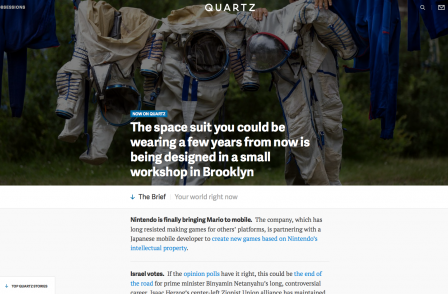
Last week Jay Lauf, the publisher of business news site Quartz, invited us to engage in a thought experiment. What would you do, he asked, if no one came to your site to read what you had written, watch what you’d filmed or listen to what you’d recorded?
Instead, these readers, viewers and listeners chose to inhabit your “satellite services”– Facebook, Twitter, the daily newsletter, Flipboard, Snapchat and so on.
In short, in a world where the third-party platform usurps the home website, what would you do about it? Could you build a sustainable publishing business? And what would it look like if you could?
Quartz’s parent company, Atlantic Media, has form when it comes to thinking the seemingly unthinkable. Back in 2008, its venerable print monthly The Atlantic was hemorrhaging money and facing, in Lauf’s words, “an existential crisis”. But instead of waiting for a Silicon Valley-backed start-up to eat its lunch, it decided to take on the role of that Silicon Valley start-up.
“Someone is going to put us out of business, so it may as well be us,” noted Lauf at last week’s Digital Media Strategies conference. (Reflecting on The Atlantic’s transformation in 2010, one journalist characterised the process as combining “a cultural transfusion, a dose of counterintuition and a lot of digital advertising revenue.”)
Reinvention is a digital necessity but perhaps platform-as-homepage is a step too far. After all, it’s abundant with risks. It means ceding control. For example, when Quartz launched in 2012 it assumed its business and economics focus would mean LinkedIn emerged as the referrer of choice. And so it proved, for a while. In 2013, LinkedIn sent more traffic to Quartz than any other social network. But when LinkedIn “decided to cut publishers off at the knees”, to use Lauf’s phrase, the traffic dried up.
But, says Lauf, to talk only of risk is to miss the point. Platform-as-homepage is happening already whether media companies like it or not.
“Publishers have less control over their traffic than ever before,” he said, pointing to the dramatic decline in homepage views to the “esteemed” New York Times as evidence of the trend. Alternatively, how about evidence from the less esteemed but increasingly effective Buzzfeed? Its videos generate one billion views a month – 95 per cent of which are off, not on, site.
When people tell Lauf how much they like Quartz, he believes they are just as likely to be talking about the Daily Brief newsletter or the Flipboard edition as they are about qz.com.
“That’s a new kind of loyalty that I have to embrace,” he said “I need to go where [the readers] are.”
Imagining a successful digital strategy where only a small minority of users visit the publication’s own site appears counter intuitive if not ill-fated. Perhaps it will prove disastrous in some instances but ever since the internet emerged as a mainstream publishing platform in the mid-1990s, it has required media firms to think differently.
In that early period, for example, many of us remained reluctant to link out to other sites believing the embedded hyperlink was the hole through which all traffic would leak. Soon most of us came to understand that the external link was not only useful for the reader but beneficial for the publisher too – earning trust, providing utility and reaping return visits. We were finally using the web, not as a walled garden, but as per design. Today, many of us readily link out to direct rivals.
As it was with the hyperlink, so it might be with Lauf’s “satellite services”.
On the impact of those LinkedIn changes, Lauf said: “Luckily, Facebook stepped in to replace [the lost traffic]. But what if Facebook changes its strategy or algorithm?” It’s the kind of question all good publishers need to ask in an era when loyalty doesn’t necessarily mean website visits.
Jon Bernstein is an independent digital media consultant and writer, formerly deputy editor then digital director of New Statesman and multimedia editor at Channel 4 News. He tweets @jon_bernstein
Email pged@pressgazette.co.uk to point out mistakes, provide story tips or send in a letter for publication on our "Letters Page" blog
